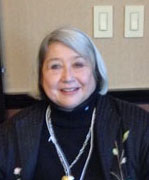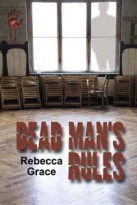
 Last week I reviewed Rebecca Grace’s Dead Man’s Rules. This week I’m happy to have her for an interview about the book and her writing life.
Last week I reviewed Rebecca Grace’s Dead Man’s Rules. This week I’m happy to have her for an interview about the book and her writing life.
Rebecca Grace is the pseudonym of Becky Martinez, a former broadcast journalist who has worked in TV newsrooms from San Diego to Seattle and from Denver to Los Angeles with a stop in Las Vegas for good measure. After 30 years she left the newsroom for five years in public relations before turning to the world of fiction writing full time. She also teaches writing classes online and has presented workshops at a number of writing conferences. Her short story, “Trouble in the Rockies” was part of an anthology, The Trouble with Romance, that was a 2006 New Mexico Book Award finalist. Her latest book, is Dead Man’s Rules, was published by The Wild Rose Press. It is the first of a three book series. Her next book will be a humorous cozy mystery, Blues at 11, coming in January 2015 from The Wild Rose Press.
AF: How has your background in journalism has influenced you as a fiction writer? I’m curious about the thinking processes, the writing skills, and the research skills, as well as the authenticity it brings to Cere’s character.
RG: When I first started writing stories at the age of 12, I knew I would always want to write in some form. That turned me to majoring in journalism in college where I worked for the school newspaper, the CSU Collegian, and I never looked back. A lucky break got me into television where I had the opportunity to work with some great news people who helped me with my writing. Several skills I learned as a journalist have carried over into my fiction writing. One was making certain that each sentence made sense and being willing to edit whatever was written. That made it easier for me when it came time to work with an editor. I always knew things could be written differently and I was willing to improve. Another thing I learned was to re-read my work out loud. It might make people around me crazy to hear me reading my work as I write, but in a TV newsroom lots of us did it so we knew how it would sound on the air. It also helps to pick out awkward phrasing, and it’s great for dialogue. Being a journalist also made me a slave to deadlines. You couldn’t just say you didn’t feel like writing and you might do it later. You didn’t have the luxury of waiting. You had to write no matter what every single day. And I pretty much do that. If I’m not writing every day, I miss it. When I’m not writing, I’m researching. As a journalist I’m very aware of my surroundings and the people around me and always looking for a story (or book) in almost any situation. That partly influenced my view of Cere. I can see her looking for a story, even in an old newspaper story. But not just any story—a story that helps her career.
AF: How much of you shows up in Cere?
RG: I think a part of me shows up in most of my characters, or perhaps my characters have qualities that I wish I had. The part of Cere that is like me is that person who is determined to find out the truth and get to the bottom of things. I think, though, that I probably wouldn’t carry things as far as she does—that may be the part I wish I was.
AF: What made you choose the northern New Mexico setting?
I grew up in southern Colorado but three of my grandparents were born in New Mexico and we visited there often. Our family vacations were usually spent in the mountains and towns of northern New Mexico. My uncle worked as a cowboy on the Vermijo Park Ranch for years and we would drive over to see him every summer and sometimes camp outside the cabin where he was working. He’d take my dad and brother fishing while my mom and sister and I went hiking in the hills. It was so beautiful and untouched. The fishing was great and sometimes we’d wake up in the morning and there would be deer right outside. I loved that part of the country. Then we would come down into Cimarron or Raton or drive over to Questa, Eagles Nest or Taos. Later my parents retired in Trinidad, Colorado, which is only ten miles from the state border so their favorite places to drive were northern New Mexico. They’d think nothing of going down to Springer or Maxwell for lunch or over to Folsom, or Capulin.
I still have ties to New Mexico because my older brother retired in Santa Fe several years ago. Just like me he loves the region and the special nature of the people who live there. He spends a lot of time exploring and whenever I visit we always hit the road and just see where we end up. When I was there in November we ended up in Abiquiu because he had never been there and he had been reading about Georgia O’Keefe. But we don’t just do the tourist haunts. We like to get on the back roads and just drive.
AF: Is Marco Gonzales based on any historical figure? If not, what inspired you to create this character? He’s dead throughout the whole book and yet he really came to life.
RG: Marco was one of those characters who just seemed to keep growing in my mind for years. He is totally fictional, but the first time I wrote the story it was partly in his viewpoint. He is a tragic figure who kept speaking to me, sort of like that ghost figure that spoke to Cere.
AF: I loved the ghost tour of the old dance hall. I’d have gone on it for sure, if I’d been a kid in Rio Rojo. Have you ever seen a ghost? What do you believe about them?
RG: I’ve never seen a ghost, though I like to believe that some people see them and they might be out there in the form of a spiritual connection. My description of the ghost tour of the old dance hall was one of those things that was a real life incident—just not the ghost part. There is an old mining company store right outside one of the Vermijo Park gates that you can’t get to anymore where there is an old handprint on the wall. The story was that the handprint was made by a bloody hand, though I don’t know if the person died. My college friends and I sneaked in one late afternoon to see it, and I think I sort of glorified my memory of that afternoon as I described the building. We did see the handprint, though, and it did give us all a spooky sensation.
AF: Freeda lived on a commune for a while as a child. (I notice her name is spelled Freeda, not the normal Frieda. Nice hippie touch.) What made you decide to include this connection to the Taos area hippie communes?
RG: Back in the late 60s and early 70s, my uncle complained about the hippies who would try to settle at Vermijo and he would have to run them off the privately owned ranch, so I was very aware of the hippies in the area. I also spent my early college years at Trinidad State Junior College and we would go over to the Taos area. We also had several communes that sprang up right outside of Trinidad. A few of my buddies were always threatening to drop out and go live off the land until we went over to visit and they saw the primitive living conditions and how hard people were working to survive.
AF: There’s a fair amount of cooking in Dead Man’s Rules. Two of the important secondary characters are restaurateurs, and their establishments come to life on the page. Are you a good cook? Are these familiar recipes or did you have to research the food?
RG: Okay, I have to admit that I am not much of a cook, but the one thing I can do is make a mean pot of red chile (I actually won a cook-off once) while my younger brother is great with green. My older brother spends much of his time going from place to place in Santa Fe and sampling both!
As for the restaurants, they are a combination of so many places I have visited. As I mentioned, my mom and dad were always going to different small cafés in the small towns in northern New Mexico and I always loved going with them. The food is always tasty and there is plenty of it. My family still loves to visit those small restaurants and cafés when we are down that way.
AF: Red or green?
RG: How about Christmas? Or for those unfamiliar with that saying, I like both red and green. It actually depends on my mood at the time.
AF: Tell me about your writing classes. What do you like best about teaching?
I teach classes on a variety of topics. In the past I have taught regularly for Savvy Authors. This month (January) I am teaching a villain class for Colorado Romance Writers. Next month I will be teaching a class on writing short stories for Maryland Romance Writers.
For me the best part of teaching is watching my students develop. I enjoy their enthusiasm and get a special feeling of accomplishment when one of them says they made a breakthrough in their writing as a result of my teaching.
At the same time, I enjoy learning from my students. There are times I find myself noticing problems in their work and then I realize I am doing the same sort of thing. Helping others also helps me improve my own writing.
AF: I hope to see a lot of Freeda in the next book. Will I? When does it come out?
RG: You’ve hit the nail right on the head. When I first put Freeda into the book I found that I had fallen in love with her as a character. She was everything I would have liked to be if I didn’t have to worry about anything or had someone around like Cere to take care of me. She was such a joy to write that I found she was taking over the story. The only way to calm her down was to give her a book of her own. And that is the second part of my series, Dead Man’s Treasure, as she continues to look for her Dad and get caught up in a mystery of her own. I am putting the finishing touches on it right now and hopefully it will be available within the year.
AF: I’m looking forward to it. Thanks so much for being my guest.
Buy Links
http://www.amazon.com/Dead-Mans-Rules-Rebecca-Grace-ebook/dp/B00I28UXFY
On the Web
www.Rebecca-grace.BlogSpot.com
www.rebeccagracewrites.wordpress.com
www.writethatnovel.com (get help with your writing)
Twitter: @RebeccaGrace55
Facebook: https://www.facebook.com/rebeccagraceauthor

Great interview! Good luck with the book. 🙂
LikeLike
Thanks! I loved writing this book, and I’m having fun writing the next two parts of the series, set in New Mexico, of course!
LikeLike
Great interview, Becky!
LikeLike
Thanks, Lisa. I really enjoyed doing this interview.
LikeLike